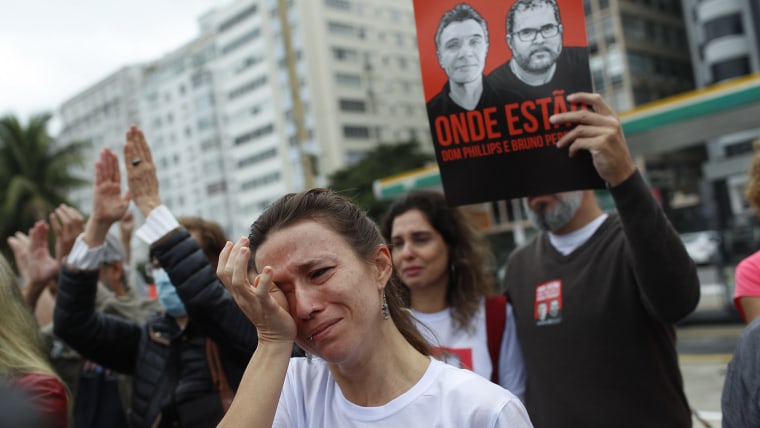Journalism is not typically thought of as a dangerous profession. Sure, there are romanticized depictions of war correspondents and the courageous reporters, photographers and videographers who venture deep into areas of political turmoil and civil unrest, ultra-corrupt countries and natural disaster sites. But the public by and large isn’t worrying about other reporters.
And yet the disappearance and alleged killing of intrepid British journalist Dom Phillips this month in Brazil’s Javari Valley shines a grim spotlight on the lesser-known but equally chilling hazards of environmental reporting.
Reporting on the environment is one of the most perilous beats in journalism.
Reporting on the environment is one of the most perilous beats in journalism.
In Phillips’ case, police say tragedy struck the veteran journalist, who has worked for such news organizations as The Guardian and The Washington Post, in a rainforest region beset by illegal fishing, poaching and other environmental crimes. Right now, reports suggest Phillips may have been killed over an illegal fishing conflict in an Indigenous reserve on the border of Colombia and Peru. Police have sought so far to play down any links to organized crime, although Indigenous activists in the area remain skeptical.
As part of my research on how journalists can more effectively cover international environmental issues, I’ve been interviewing environmental reporters whose work made them targets of physical, legal, economic and psychological attacks — among them journalists imprisoned in Liberia, sued in India, harassed into self-exile in Nigeria and physically assaulted in Egypt.
The attacks led some to change profession. For others, the attacks strengthened their sense of mission and reinforced their commitment to the watchdog role of journalism. Either way, many suffer long-term psychological ramifications, such as depression and substance abuse.
Globally, most reported incidents — like Phillips’ killing — take place in lesser-developed countries in Southeast Asia, Africa and Latin America. This means journalists investigating environmental problems are at particular risk in remote areas out of view of major news media.
“In those places, those countries, a lot of the money and wealth is connected to natural resources, so covering extraction, exploitation, degradation, even the trade in natural resources, is covering very large sums of money and important and sizable business and financial interests,” executive director Meaghan Parker of the Society of Environmental Journalists told me recently.
“Many have poor or unclear governance on how to manage natural resources and how to enforce or don’t enforce laws covering natural resources,” Parker said.
And Phillips' slaying is just the most recent in a series of anti-journalist actions in Brazil specifically.
Phillips’ slaying is just the most recent in a series of anti-journalist actions in Brazil specifically.
Only two months earlier, the Brazilian subsidiary of Britain’s Brazil Iron mining company called police to accuse journalists Daniel Camargos and Fernando Martinho of trespassing when they visited the company seeking comment about the effects of mining activities on local communities. According to the Committee to Project Journalists, a press rights advocacy group, the pair were kept at a police station for about an hour, then released without charges.
Elsewhere in Latin America, Dutch journalist Bram Ebus was detained and interrogated by the National Guard and military intelligence in Venezuela while investigating illegal mining in Indigenous communities there. In Guatemala, police raided a news outlet and the homes of journalists and harassed reporters covering protests against mining operations at a nickel processing plant, according to news reports.
In Africa, Der Spiegel correspondent Bartholomaeus Grill and a Swedish freelance photographer were detained by village residents and police and threatened by a rhino poaching kingpin in Mozambique.
Journalists reporting on environmental controversies in developed countries are also targets, as in Finland, where journalists cited environmental issues — along with immigration, racism, religion and gender equality — as “trigger subjects that generate threats and harassment.”
Journalists in the U.S. and Canada aren’t immune either.
Several U.S. reporters were arrested while covering protests against the Dakota Access oil pipeline, as were Canadian journalists covering demonstrations against hydraulic fracturing near First Nations land in New Brunswick, and a controversial hydroelectric project in Labrador.
In my view, there are two major reasons why environmental journalists are targeted. Both reflect greed — greed for money and greed for power — at the expense of the environment and the public good.
As the latest annual Global Impunity Index from the Committee to Protect Journalists observed, “No one has been held to account in 81% of journalist murders during the last 10 years.”
First, environmental controversies frequently involve well-connected business and political interests, corruption and criminal conduct such as illegal mining, logging and poaching. Those stories also fall into the portfolios of business, crime and corruption reporters.
Many of these issues involve conflicts over environmental injustice, social and economic inequities and Indigenous rights to natural resources and land — in other words, the powerful exploiting the powerless.
Second, those who attack environmental journalists, especially physically through kidnapping, assault and murder, operate largely with lack of accountability and little reason to fear punishment.
As the latest annual Global Impunity Index from the Committee to Protect Journalists observed, “No one has been held to account in 81% of journalist murders during the last 10 years.”
History and current events both show that those responsible are unlikely to be arrested, let alone convicted and imprisoned for their crimes against journalists. In fact, law enforcement and government officials are often in cahoots with civilians, crime gangs and businesses responsible for some of those atrocities.
As Parker put it, “If you’re threatening money and power in a place with poor governance, you’re going to be at great risk.”

